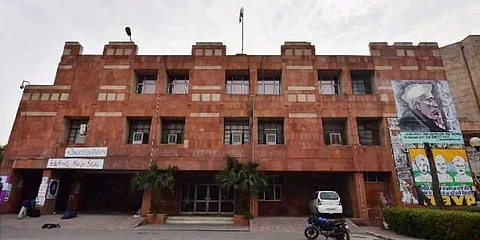

Dr Rosina Nasir, a tenured Assistant Professor of the Centre for the Study of Social Exclusion and Inclusive Policy, School of Social Sciences at the Jawaharlal Nehru University has not been paid for 15 months. She holds a special post in the centre and her salary is paid by the University Grants Commission (UGC) which funds the centre. The Delhi High Court recently pulled up the Jawaharlal Nehru University in the case and asked them to pay her dues, within a week irrespective of whether the UGC has paid it or not. But it's not just about the money — what has affected her more is that the varsity has also allegedly barred her from taking on research scholars as PhD students, even though her centre majorly deals with research.
Why is there a delay in the release of funds?
While JNU had said on record that they did not receive the grant, UGC had told the court, in their response, that they had not got the necessary documents to clear the grant. But Justice V Kameswar Rao said that irrespective of the miscommunication between the two authorities, the teacher has to be paid. "Be that as it may, as the petitioner has not been paid salary for more than a year, I direct the arrears of the salary with effect from April 2020 till date shall be released to the petitioner within one week from today by JNU. Any inter se issue between the UGC and the JNU shall be worked out by their officers. Any delay beyond the period of one week in releasing the arrears of the salary shall be taken seriously including proceeding under the provisions of Contempt of Court Act," he directed.
Second time unlucky
But this is not the first time that Dr Nasir has not received her salary for a long time. She said that her salary was on hold from October 2017 onwards. "I filed a writ petition on November 27, 2018, and then my salary was released in the month of May 2019. There was a gap of 18 months that time," she said.
In March 2019, she got an extension as a tenured professor when a UGC public notice provided her an extension. But despite the extension notice, her salary was stopped from April to June. "This time I did not go to court but wrote to the minority commission. That helped," added Dr Nasir. But this was after she was threatened by a university official. "He told me that they would barge into my house and throw my things out. He made it clear that they would not shy away from even using force. That's when I wrote to the Delhi Minority Commission and the issue was resolved fairly quickly," she added.
Dr Nasir said that she could not believe that the JNU administration could believe this. "I was in University of Hyderabad before I shifted here in 2013. The selection committee said that even though it is a tenured position, it wasn't very different from a permanent post and I would enjoy all the perks. And I did. I was under the impression that JNU is a completely different kind of university until March 2017," added the teacher.
Adding academic insult to injury
But it is not just her salary that has been stopped. Dr Nasir said that she has not been allowed to take in PhD students anymore even though the centre is specifically meant for higher studies and research. "I had students who had to change guides because the JNU administration was not allowing me to take on PhD students," she said. "I have also been denied entry to all faculty meetings since 2017. What suddenly changed?" she asked.
But why blame JNU alone? Dr Nasir said that JNU is being vindictive. Similar centres have been set up in other universities as well, including her previous place of employment, UoH. "UGC has not paid those universities either but they are not exempting their tenured staff," said Dr Nasir. The professor said that it's not just about the money but the fact that her academic freedom is being hampered.
The JNU Teachers' Association lauded the HC's decision and said that the JNU administration's behaviour is unconstitutional. "The fact that JNU's administration chose to repeat what the court had deemed as unconstitutional in the first instance, and that too during an ongoing pandemic, when families are already under a lot of strain, shows the high level of insensitivity that marks the current administration headed by Dr Jagadesh Kumar, who has absolutely no qualms about repeatedly violating the laws of the land," said the JNUTA in a statement.
We tried contacting the Registrar for a comment but haven't yet received a reply. The story will be updated as and when he replies.
